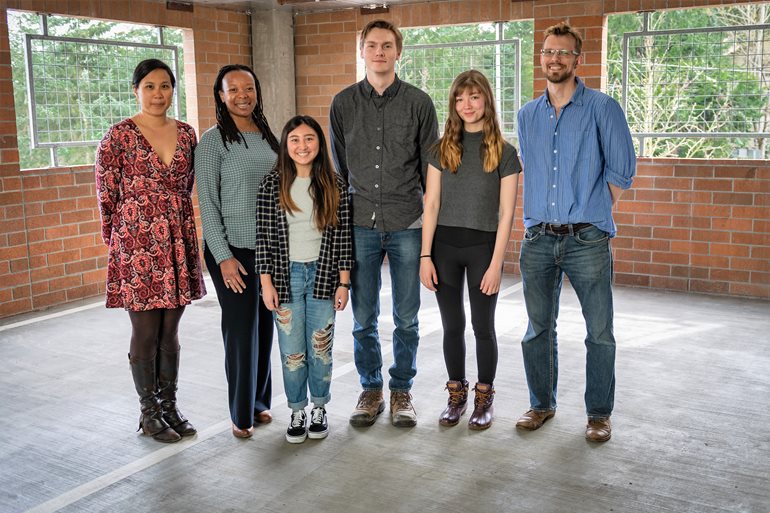
By Douglas Esser
A changing climate may bring extreme weather — drought, flood, heat. How plants such as corn might respond to that stress is an area of research for three Mary Gates scholars at the University of Washington Bothell. A fourth Mary Gates scholar studies how noble firs are recovering in an extreme environment — the blast zone of Mount St. Helens.
Thelma Madzima, an assistant professor in the School of Science, Technology, Engineering & Mathematics, leads the research into plant response to climate change. Madzima collaborates with two more faculty members in the Division of Biological Sciences, Cynthia Chang and Jesse Zaneveld, in mentoring the three students studying plant stress. Separately, Chang also mentors the student involved in tree research at the volcano.
Mary Gates Research Scholarships are awarded each year to UW undergraduates engaged in faculty-guided research. These prestigious awards provide $5,000, disbursed over two academic quarters. The scholarships were endowed by Bill and Melinda Gates in 1995 to honor the memory of his mother, Mary Maxwell Gates, who served as a UW regent from 1975 to 1993.
Kaheerman Saibire, learning genetics

In one of Madzima’s projects, Kaheerman Saibire uses molecular biology and genetics techniques to study stressed corn seedlings.
Saibire, a Biology major graduating in summer 2019, had never conducted research before she connected with Madzima in an Introduction to Genetics course. “I had a lot of questions,” she said, “and really appreciate how she was patient with me. I learned a lot.”
Receiving the Mary Gates scholarship is substantial help, said Saibire, an international student from China who learned English and received an associate degree at South Seattle College.
“I just got lucky to get a chance to do this,” Saibire said. “I know some people never get a chance because it’s way too competitive.”
A member of the Uyghur minority in China’s northwest Xinjiang region, Saibire also works as a student assistant at the UW Bothell Center for International Education. After graduating she hopes to go to medical school.
Rachel Calder, using bioinformatics
Rachel Calder, a Biology major graduating in June, researches another aspect of climate stress on corn with Madzima and Zaneveld, an assistant professor with expertise in bioinformatics.
“People are concerned about yield, so I’m looking at all different kinds of stressors,” said Calder, who analyzes genetic data with computer techniques she learned from Zaneveld.
Madzima and Zaneveld said that not many students have molecular and computational experience.
“Rachel led the charge in terms of researching appropriate methods and putting them together,” Zaneveld said. “This is Rachel’s thing, and I’m proud of the work she’s done on it.”
Calder presented her research in March at the Maize Genetics conference in St. Louis. She also works as an education coordinator at the Institute for Systems Biology in Seattle and plans to continue research in graduate school. “I know I love genetics.”
Jackelyn Tolentino Garcia, rising to the occasion
Jackelyn Tolentino Garcia, a Biology major planning to graduate in winter 2020, also conducts climate change research with Madzima and Chang, an assistant professor. They use a small, short life-cycle plant subjected to simulated periods of drought and heavy rainfall in the Sarah Simonds Green Conservatory on campus.
“I look at how that change in variable conditions will impact plant evolution, looking at observable traits — height, amount of seed pods — and assess if it’s doing well or poorly,” Garcia said. “I can look at my data and see how plants compare. If the parent experiences drought, does the child plant do better in drought? In heavy watering as well?”
Garcia will present her research this summer at an Ecological Society of America conference in Kentucky.
Chang and Madzima said Garcia dedicates a lot of time and effort to the research. “I think we put more on her because she keeps rising to the occasion,” Madzima said.
Alex Wachter, exploring the zone
Alex Wachter, an Environmental Science major planning to graduate in 2020, conducts research with Chang in the zone blasted by the 1980 eruption of Mount St. Helens.
“We’re looking at the species composition of regrowth and trying to determine what factors play the biggest role in biodiversity. We’re looking at a tree — the noble fir — and trying to simulate the different effects,” Wachter said.
This is only one aspect of Chang’s research into the recovery of the volcanic area that, nearly 40 years after the eruption, still does not look like the forest it was previously. The research next trip, backpacking more than 2 miles into the remote area, is planned for this summer. Chang said Wachter will be the crew leader.
The Mary Gates scholarship gives Wachter time for research, instead of having to work a summer construction job. He hopes for a career in forestry.
In support of collaboration
The Mary Gates scholars said they value the opportunity to work with faculty who collaborate not only on their research but also their mentoring.
“We do a lot of research, and all of that is overlapping,” Calder said. “I think that’s something that’s unique about the Bothell campus.”



